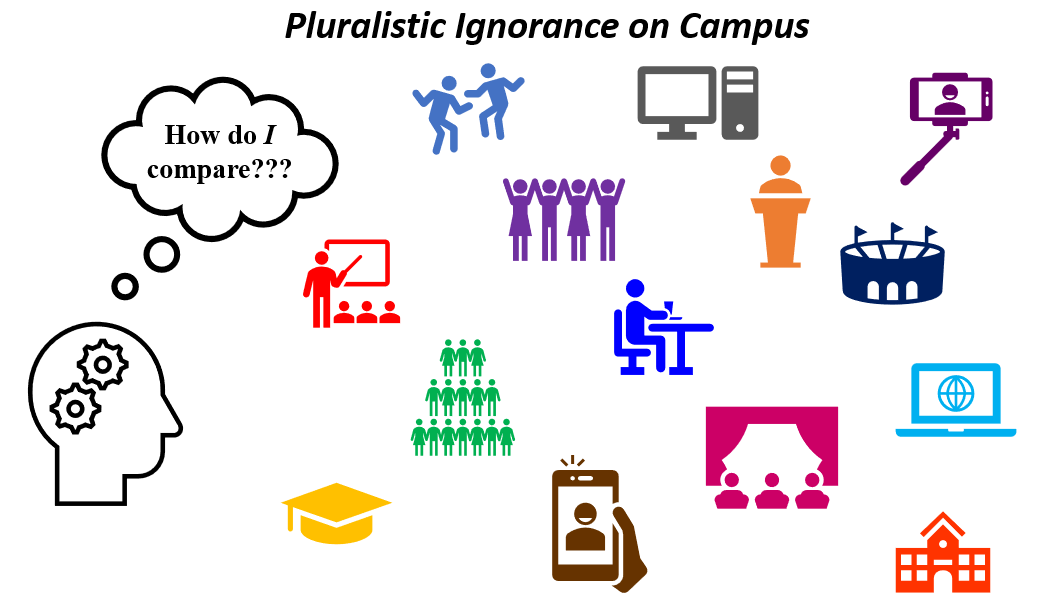Pluralistic ignorance generally refers to “erroneous cognitive beliefs shared by two or more individuals about the ideas, feelings, and actions of others” (O’Gorman, 1986, p. 333). This is a classic construct in social psychology, generally known as a means of exploring negative or risky behaviors of college student populations like drug and alcohol use (Suls & Green, 2003) or sexual behaviors (Kuperberg & Padgett, 2017). But how might it relate to a more modern and positive college student experience?
We were able to address the concept of pluralistic ignorance in relation to certain aspects of student engagement with the development of an experimental item set from the 2018 NSSE administration. The existing approach for measuring pluralistic ignorance involves asking respondents to make two assessments of behaviors: one using the self as the reference point (During the current school year, about how often have you done the following?), and one using peers as a reference point (During the current school year, about how often do you think most other students at your institution have done the following). This item set was given to 5,025 first-year students and 5,487 seniors at 33 institutions, and the data was then used for two different studies based on this established paradigm for assessing pluralistic ignorance through comparing the self vs. other reference responses.
NSSE Research Scientist Angie Miller partnered with University of South Florida professor Amber Dumford and a group of graduate students to focus on research questions about social media use and campus activity involvement. The study on social media use, published in Computers and Education Open, found that students perceived others to be both posting and viewing social media more than themselves. This was true for both first-year students and seniors. However, there were also some differential patterns by (institution-reported) sex, with males perceiving a large self-other gap. There was also a main effect for sex, meaning that females perceived both themselves and other students to be posting and viewing social media more frequently than males. These findings add some nuance to our understanding of students’ use of social media as part of their overall educational experience, and how those perceptions of their classmates might affect their own behavior in a variety of ways.
Another study looked at campus involvement. Generally considered a behavior that we should encourage in students, this is a more positive conceptualization of the pluralistic ignorance construct. This article, published in The Journal of Campus Activities Practice and Scholarship, explored students’ self vs. other perceptions of how often they attend campus activities and events, as well as an estimate of weekly hours spent participating in co-curricular activities. Overall, the findings from these analyses also found evidence of pluralistic ignorance, meaning that students perceive other students to attend more campus activities and spend more time on co-curriculars than they themselves do. For seniors, there was also an effect for (institution-reported) sex, with this discrepancy slightly larger for females. This application of pluralistic ignorance might help in advising students on how much time they should be spending outside of the classroom in co-curricular activities, taking into account their perceptions of their peers.
These studies illustrate how NSSE data can be used to address some more modern takes on an older, established psychological concept. The results demonstrate that pluralistic ignorance is still relevant to our understanding of college students, and that it can be applied to both positive and negative behaviors. Given this, can we develop new ways to help students “re-calibrate” their self-other comparisons for a more accurate understanding? This research will hopefully invite faculty, advisors, and administrators to discuss and even counter the misconceptions of social cues and norms that students may have, prompting students to consider how perceptions of their classmates might affect their own behavior in both positive and negative ways.



